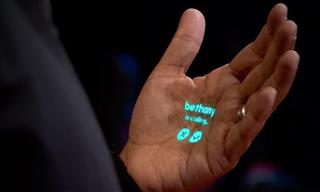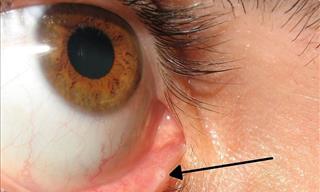

So how does this new device work? Cancer affects the metabolic rate of skin cells, with cancerous cells heating up faster than their healthy counterparts following a shock of cold temperature.
To make identifying these cells easier, the McMaster University team comprised of Michael Takla, Rotimi Fadiya, Prateek Mathur and Shivad Bhavsar, built a skin cancer detector with 16 thermistors that can track the rate of temperature increase following a cold shock from an ice pack. The thermistors are simply placed on the potentially cancerous area of skin, and the device produces a heat map that can be used to determine the presence of melanoma.
The team used widely available and inexpensive components, which allows for melanoma skin cancer detection to be readily accessible to many. It is, undoubtedly, a very clever device that has the potential to save lives around the world. Alongside the Dyson Award, the team also received a cash prize of $40,000 to advance their research and they also received $10,000 at the Forge's Student Start-Up Pitch competition in March.
The team was inspired to create sKan after realizing technology hadn't had the same impact on skin cancer diagnosis as it had on other medical fields. They found research that used the thermal properties of cancerous skin tissue as a means of detecting melanoma. But this was done using expensive lab equipment. So they set out to invent a way of performing the same assessment using a more cost-effective solution.
This will be a big leap forward in the area of detecting skin cancer. As the Guardian reported, nearly 39 people are diagnosed with skin cancer every day in the U.K., and the American Cancer Society estimates 87,110 new cases of melanoma will be diagnosed in the U.S. by the end of 2017, with 9,730 people dying from the condition. So, early detection is key to cancer survival - let's hope that sKan succeeds in significantly reducing that number.
Going forward the sKan team hopes to create a more advanced prototype that will allow them to begin pre-clinical testing. “Our aspirations have become a reality,” said Mathur. “Skin cancers are the most common form of cancer worldwide, and the potential to positively impact the lives of those affected is both humbling and motivating.”
Discover more about sKan in the video below:

Muscle Degeneration Starts with these 8 Early Symptoms!
Are you familiar with muscular dystrophy? Spot the early signs of this disease by being aware of these tips.

This Tiny Device Could Be the Future of Cancer Detection!
This tiny microbiopsy device can help detect skin cancer without leaving any scars whatsoever! read all about it here.

Prevent a Heart Attack From Occurring with These Tips
What should you do when recovering from a heart attack? Find out here.
 4:35
4:35
Have New Studies Found a Link Between Eggs & Breast Cancer?
Have studies discovered a link between eating eggs and breast cancer?
 5:04
5:04
Ever Wondered How Hormones Work? Well, Wonder No More...
Ever wondered how hormones work? Well, wonder no more as this informative TED-Ed video explains all!

These Bodily Functions Are Beyond Our Power
Do you know why we experience these bodily functions? Find out here!

16 Interesting Things We Bet You've Never Seen Before
Once we have finished school and learned all the necessary skills at work, it may seem that no further studying is necessary. 16 interesting photos you wish you had seen in textbooks at school.
 13:55
13:55
The Disappearing Computer: Revolution on a Personal Scale
What happens when we lose the physical large computer all together? This lecture explains what ahead for computers.

I Never Knew These Stunning Facts About Our Universe
If you thought you understood the universe, you'll be completely floored by this insane facts.

These 18 Photos Capture the Universe Like Never Before!
See the universe in a new light with these astonishing photos.

Guide: All About the Gut-Brain Connection in Your Body
it's becoming increasingly clear just how influential our tiny gut microbes are in shaping our mood and even our overall health.

10 Tech Products You Must Double-Check Before Buying
Beware! These tech products are most commonly faked.
 16:28
16:28
This Secret Invention Changed the Course of WW2
Let’s take a closer look at the proximity fuze, also called Vt Fuze, an invention that changed the course of the second World War.
 26:43
26:43
These 20 Tech Inventions Will Define the Next Decade
The future is here. Check out some emerging technologies that are all set to chane our world forever.

Incredible New Bionic Arm Fuses With Woman's Nerves
Karin's bionic hand is real sci fi, making her one of the first true cyborgs.
 5:01
5:01
The Truth About Folding Phones You Need to Know
Don’t buy a foldable without knowing this first.

Ponder Life's Big Questions with a Truly Brilliant Mind
Dr. Michio Kaku is known around the world for his brain power and ability to explain complex concepts with effortless ease. Here are his thoughts.
 15:55
15:55
This Incredible Documentary Takes You Into the Human Body
A beautiful and graphically advanced animation sheds light on the mysteries of the human body.

These Photos Show How Dependent We are On Smartphones
Technology has taken over and these funny (but true) photos help to drive this fact home.

20 Useful Facts About the Science of Cooking
The science behind cooking is not often thought of, but it plays a crucial role in a dish turning out right. Here are 20 facts on the science of cooking.

Study: Biggest Ocean in the World is.. Underground?
A groundbreaking discovery by researchers reveals an enormous water reservoir deep beneath the Earth's surface.

Scientists Develop Wrap That Determines if Food is Spoiled
Scientists at MIT have developed a biodegradable plastic-like wrap that changes color when food goes bad. Find out more…
 20:01
20:01
Future Tech: 19 Innovations About to Change Our World
These groundbreaking new technologies will change our world.
 2:52
2:52
New Robots: This Robot Uses Both Wheels AND Legs
This robot can get just about anywhere in little time because it uses both wheels and legs to get over most hurdles.

Doctors Make History With First Whole Eye Transplant
Surgeons in New York have performed the world’s first transplant of an entire human eye!
 6:21
6:21
How to Make Cleansing Hydrogen Water from an Old Battery
Let's embark on this scientific journey to unlock the potential of water and discover the practical uses of hydrogen and oxygen in everyday life.

See the World From Up Close - 17 Fascinating Macro Photos
Seeing ordinary objects like honey, paracetamol, and snow through a microscopic lens teaches us how beautiful and intricate they really are!

6 Harmful Toxins You Didn’t Know You Encounter Daily
These toxic chemicals can be found in everyday products and can be extremely dangerous to us.

5 Robotics Trends Anticipated in 2024
What does 2024 have in store for the field of robotics?

Is It 3024 Already?! – 14 Wildly Futuristic Things
These revolutionary ideas are about to change our world.

GUIDE: How Alcohol Affects Us, Drink by Drink...
In this article, we're going to discuss the exact amounts of alcohol in our blood and what they look like, including how each level affects us and our ability to function.
 13:21
13:21
The Race to Complete the World's Second-Tallest Skyscraper
Malaysia is all set to unveil the world’s second tallest skyscraper.
 7:21
7:21
Science: 20 Mechanical Principles Demonstrated Using Lego
In this video, we'll explore a variety of fascinating mechanical mechanisms, all demonstrated using Lego models.

Wonder Why Time Speeds Up As You Age? Here's the Answer
We all get the sensation that time moves faster as we get older, but there are scientific reasons for that. Read on to learn about this fascinating phenomenon.
 5:50
5:50
The Rise of the Machines: Can Humanoid Robots Help Us?
Will humanoid robots change the way we work forever?

10 Unanswered Mysteries You've Always Wondered About!
You might not have thought about the most curious cases of the bizarre things that we encounter every day.
 9:34
9:34
Was Roman Concrete Really Superior to Our Own?
How did Ancient Romans make such durable concrete that it still lasts today?

These Wacky Inventions of the Past Appear Odd to Us Today!
These vintage tech inventions may look very interesting or even incredible, but their practicality today is questionable...
 15:41
15:41
Keep Your Home Safe with These Handy Gadgets
These 13 devices will transform your home security.

Wow! Who Knew That Jupiter Was So Mesmerizing?
Take a look at Jupiter like you've never seen it before!

7 Little-Known Body Parts We Never Knew About
Here's a look at some of the weird and little-known body parts that you didn’t know you had.

Satisfy Your Curiosity About the Universe with These Q&As
Discover more about the universe by reading through these facts.
 6:31
6:31
The Psychology Behind Why Some People Are Habitually Late
Now we finally know why some people are habitually late.
 6:33
6:33
The Story of the Internet: Who REALLY Invented It?
Who really invented the internet, and why did they REALLY do it?
 12:55
12:55
Watch This Man Build a Future Using Trash from the Past
In this video, you will see what this incredible community has been able to accomplish by building homes from recycled materials.

INTERACTIVE: How Personal Items Have Changed Over Time
Some of you will be old enough to remember what many of today's objects used to look like. Here are 20 such objects. Click to see them as they used to be.

6 Fascinating Stories of Accidental Medical Discoveries
From penicillin to pacemakers, here are the medical breakthroughs that were discovered by accident.


